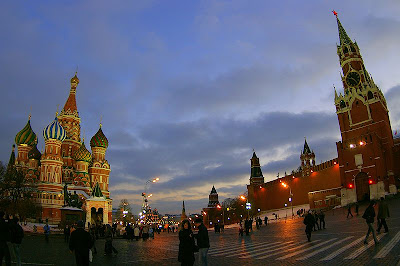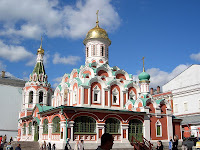Red Square is the most famous city square in Moscow, and arguably one of the most famous tourist attractions in the world. The square separates the Kremlin, the former royal citadel and currently the official residence of the President of Russia, from a historic merchant quarter known as Kitai-gorod. As major streets of Moscow radiate from here in all directions, being promoted to major highways outside the city, Red Square is often considered the central square of Moscow and of all Russia.
 The rich history of Red Square is reflected in many artworks, including paintings by Vasily Surikov, Konstantin Yuon and others. The square was meant to serve as Moscow's main marketplace. It was also used for various public ceremonies and proclamations, and occasionally as the site of coronation for Russia's czars. The square has been gradually built up since that point and has been used for official ceremonies by all Russian governments since it was established.
The rich history of Red Square is reflected in many artworks, including paintings by Vasily Surikov, Konstantin Yuon and others. The square was meant to serve as Moscow's main marketplace. It was also used for various public ceremonies and proclamations, and occasionally as the site of coronation for Russia's czars. The square has been gradually built up since that point and has been used for official ceremonies by all Russian governments since it was established.The name Red Square derives neither from the colour of the bricks around it which, in fact, were whitewashed at certain points in history nor from the link between the colour red and communism. The name came about because the Russian word красная (krasnaya) means red or beautiful. This word, with the meaning beautiful, was originally applied to Saint Basil's Cathedral and was subsequently transferred to the nearby square. It is believed that the square acquired its current name in the 17th century. Several ancient Russian towns, such as Suzdal, Yelets, and Pereslavl-Zalessky, have their main square named Krasnaya ploshchad, namesake of Moscow's Red Square.

 The buildings surrounding the Square are all significant in some respect. Lenin's Mausoleum, for example, contains the embalmed body of Vladimir Ilyich Lenin, the founder of the Soviet Union. Nearby to the south is the elaborate brightly-domed Saint Basil's Cathedral and the palaces and cathedrals of the Kremlin.On the eastern side of the square is the GUM department store, and next to it the restored Kazan Cathedral. The northern side is occupied by the State Historical Museum, whose outlines echo those of Kremlin towers. The Iberian Gate and Chapel have been rebuilt to the northwest.
The buildings surrounding the Square are all significant in some respect. Lenin's Mausoleum, for example, contains the embalmed body of Vladimir Ilyich Lenin, the founder of the Soviet Union. Nearby to the south is the elaborate brightly-domed Saint Basil's Cathedral and the palaces and cathedrals of the Kremlin.On the eastern side of the square is the GUM department store, and next to it the restored Kazan Cathedral. The northern side is occupied by the State Historical Museum, whose outlines echo those of Kremlin towers. The Iberian Gate and Chapel have been rebuilt to the northwest.The only sculptured monument on the square is a bronze statue of Kuzma Minin and Dmitry Pozharsky, who helped to clear Moscow from the Polish invaders in 1612, during the Times of Trouble. Nearby is the so-called Lobnoye Mesto, a circular platform where public ceremonies used to take place. Both the Minin and Pozharskiy statue and the Lobnoye Mesto were once located more centrally in Red Square but were moved to their current locations to facilitate the large military parades of the Soviet era. The square itself is around 330 meters or 1100 ft long and 70 meters or 230 ft wide.







No comments:
Post a Comment